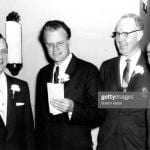Imagine the editor of a major magazine running a column that aims multiple layers of criticism at the United States and its leadership (including President Trump). Imagine, too, that this editor takes lots of flack from scholars for distorting criteria for assessing the nation and POTUS. Imagine, finally, how readers are supposed to figure out which side in this debate is right. Is the editor in a bubble of political assumption that is distant from the way rank-and-file Americans understand their nation and the presidency? Or are the historian critics themselves out of touch with the real threat that the current administration in the White House poses to the United States?
And what if none of the interlocutors in this debate care at all about the opinions or reading habits of regular Americans? What if, instead, the argument is really between American elites who are protecting professional standing?
If you think this scenario applies to Mark Galli’s editorial in Christianity Today in support of impeaching Donald Trump or to those critics who claimed the magazine’s editor was out of touch with regular evangelicals, you are wrong. The scenario above is actually about the New York Times’ 1619 Project and the negative response by leading historians of the United States. At the Atlantic, Adam Serwer covered some of the fallout among professional historians to the Times’ editorial effort to show that slavery is the defining aspect of American history.
The reaction to the project was not universally enthusiastic. Several weeks ago, the Princeton historian Sean Wilentz, who had criticized the 1619 Project’s “cynicism” in a lecture in November, began quietly circulating a letter objecting to the project, and some of Hannah-Jones’s work in particular. The letter acquired four signatories—James McPherson, Gordon Wood, Victoria Bynum, and James Oakes, all leading scholars in their field. They sent their letter to three top Times editors and the publisher, A. G. Sulzberger, on December 4. A version of that letter was published on Friday, along with a detailed rebuttal from Jake Silverstein, the editor of the Times Magazine.
The letter sent to the Times says, “We applaud all efforts to address the foundational centrality of slavery and racism to our history,” but then veers into harsh criticism of the 1619 Project. The letter refers to “matters of verifiable fact” that “cannot be described as interpretation or ‘framing’” and says the project reflected “a displacement of historical understanding by ideology.” Wilentz and his fellow signatories didn’t just dispute the Times Magazine’s interpretation of past events, but demanded corrections.
In the age of social-media invective, a strongly worded letter might not seem particularly significant. But given the stature of the historians involved, the letter is a serious challenge to the credibility of the 1619 Project, which has drawn its share not just of admirers but also critics.
(For additional attention to professional historians’ reaction, see this.)
From the perspective of elitism vs. populism, the interlocutors involved here are all elites, whether in the academic or journalistic worlds. If anyone is worried about “the people,” it may be the historians who are concerned about public school teachers using the Times’ experiment in historical interpretation to shape impressionable students. According to Serwer:
“To teach children that the American Revolution was fought in part to secure slavery would be giving a fundamental misunderstanding not only of what the American Revolution was all about but what America stood for and has stood for since the Founding,” Wilentz told me. Anti-slavery ideology was a “very new thing in the world in the 18th century,” he said, and “there was more anti-slavery activity in the colonies than in Britain.”
Not one of the historians seems to be concerned that the Times is out of touch with the American heartland. Much more at stake is professional turf — who has the right and responsibility to interpret and present national history? Historians? Or journalists? So far, no one seems to have provided a flow chart of elite institutions in the United States and whether the Times or the Atlantic are above or below Ivy League universities in prestige and influence.
But when it comes to evangelicalism, and especially Mark Galli’s editorial in support of impeachment, the main question is whether the editor of Christianity Today (now retired) reflects the views of ordinary evangelicals. The push back to Galli’s essay has even prompted discussion of whether evangelicalism is essentially a populist religious thing (no one is entirely sure what evangelical Protestantism is without institutions to police its borders). John Fea has even turned the charge of elitism back on Galli’s critics by claiming that they may be out of touch themselves while also contending that a form of elitism (as in rigorous thought) is a good thing if if means seeing Trump for the immoral narcissist that he (allegedly) is.
Frankly, no one in this debate (I suspect), neither Galli and his defenders nor his critics spend much time in the Protestant circles where Paula White, Franklin Graham, and Jerry Falwell, Jr. hang out. In a way, the debate over evangelical elitism is all about elites thinking their finger is closer to the pulse of evangelicalism than the other side. It is akin to the debate between elite journalists and elite historians over the meaning of 1619.
But here is the difference. Evangelicalism has no elite institutions, no college or university that compares with Harvard or magazine that compares with the Atlantic. How would someone possibly argue that Wheaton College is more prestigious than Messiah College? Or that Christianity Today has more cache than First Things? Someone could possibly rank colleges according to selectivity in admissions or the caliber of faculty publications. Someone might also rank magazines by circulation or authors’ pay scales. But in the United States, once you leave the world of the Times, Atlantic, and Brown University, you have left the ranks of the nation’s elites and the cultural institutions that define superiority. When you enter the world of evangelicalism you go into a place that is marginal to the real centers of influence — elite universities and think tanks, national newspapers and magazines, Hollywood and television outlets.
Truth be told, the real evangelical elites are the ones who write for elite magazines and newspapers. In this context, figures like Peter Wehner and Michael Gerson are elite because they write for the Atlantic and Washington Post respectively. It also happens to be the case that both men worked in the White House for Republican presidents.
The moral of this lesson is that the way to become an elite evangelical is to write speeches for the President of the United States who is a member of the Republican Party. (The other way is to be Billy Graham, who spent a fair amount of time, oh by the way, with Republican POTUSes.)












